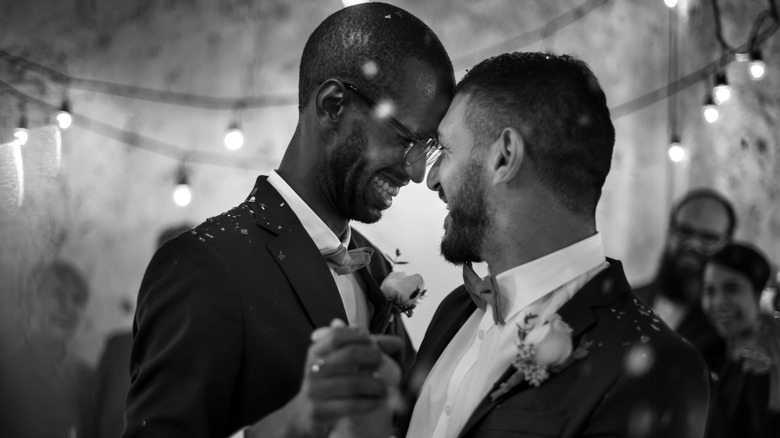You Probably Shouldn't Make A 'B-List' For Your Wedding Invitations
Your wedding day may be one of the most stressful events in your life. That pre-wedding anxiety typically begins in the early planning stages as you choose venues, flowers, decor, music, gowns, tuxedos, and the dreaded guest list. Though every other wedding aspect is important, the number of people you invite will dictate where you have the wedding, the amount of food you need, and your overall budget. As couples choose who will attend their nuptials, they start weighing out who is meaningful enough to make the invite list. Close family members, best friends, and college roommates are usually guaranteed a spot at the ceremony. But what about the folks who aren't necessarily a part of your closet crew but have played a role in your life? Well, there is a list for them.
The famed B-list is the solution for your not-so-close friends who still have a chance at attending the wedding. The Wedding Wire describes the B-list as a record of potential attendees who didn't make the initial guest list but are possible stand-ins for those VIPs who can't attend. B-list guests are perfect when your brother-in-law tells you about his hip surgery the weekend of your wedding. Your old soccer coach or former family physician would then gain his spot. While it seems like a good gesture, some wedding experts believe couples should avoid making one altogether, and their reasons are surprisingly valid.
Your A-listers are very likely to come through for you
With your wedding day being an occasion to celebrate love with your significant other, it's vital that people who support your union are there to bear witness. The ideal wedding guest usually knows the history of your romance. They likely have a personal relationship with you both and are happy for you. These people typically have excellent wedding etiquette, such as purchasing registry gifts, responding on time, and honoring the plus-one rules. So with such great A-listers, why on earth would anyone need a B-list?
As stated, the secondary invitees are suitable when people drop out of the wedding. However, considering that 70 to 85% of invited guests actually do attend the ceremony, there is a good chance you may not reach out to anyone in your backup plan to fill in for no-shows. If you ask 100 people to come, a turnout of 70 doesn't sound so bad.
Are the B-listers your friends, or do you simply want more spectators?
Is the cashier at the local bodega you have frequented for the past ten years actually your friend, or are they just very good at making small talk while they bag up your snacks? You may feel a connection with your brother's ex-girlfriend from five years ago because you exchange the occasional photo comments on Facebook, but when was the last time you hung out? Examining your B-list closely might make you realize that the people added to it are only somewhat valuable relationships. The A-listers are almost certainly people you'd be disappointed to know aren't coming, whereas B-listers are disposable in the grand scheme of things.
For this reason, Jen Glantz, founder of Bridesmaid for Hire, also agrees that the B-list is a waste of time entirely. "Ask yourself if you really do want to invest in having them at your wedding because every person you invite is an investment since you're paying for them to be there," Glantz told Brides.com, and honestly, she has a point.
If this day isn't overwhelming enough, don't burden yourself with additional tasks such as a hypothetical just-in-case group of people. If you aren't besties with any of your B-listers, there's a good chance of no hard feelings if they don't receive an invite. When all else fails, a minimalist wedding with limited guests can eliminate the entire A-list, B-list debate for good. Your budget will thank you in the end.


